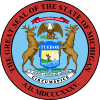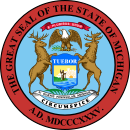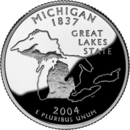Portal:Michigan
The Michigan Portal  Michigan (/ˈmɪʃɪɡən/ MISH-ig-ən) is a state in the Great Lakes region of the Upper Midwest region of the United States. It borders Wisconsin to the northwest in the Upper Peninsula, and Indiana and Ohio to the south in the Lower Peninsula; it is also connected by Lakes Superior, Michigan, Huron, and Erie to Minnesota and Illinois, and the Canadian province of Ontario. With a population of nearly 10.12 million and an area of 96,716 sq mi (250,490 km2), Michigan is the 10th-largest state by population, the 11th-largest by area, and the largest by area east of the Mississippi River. Its capital is Lansing, and its largest city is Detroit. Metro Detroit is among the nation's most populous and largest metropolitan economies. The name derives from a gallicized variant of the original Ojibwe word ᒥᓯᑲᒥ (mishigami), meaning "large water" or "large lake". Michigan consists of two peninsulas. The Lower Peninsula resembles the shape of a mitten, and comprises a majority of the state's land area. The Upper Peninsula (often called "the U.P.") is separated from the Lower Peninsula by the Straits of Mackinac, a five-mile (8 km) channel that joins Lake Huron to Lake Michigan. The Mackinac Bridge connects the peninsulas. Michigan has the longest freshwater coastline of any political subdivision in the United States, being bordered by four of the five Great Lakes and Lake St. Clair. It also has 64,980 inland lakes and ponds. Michigan has the second-most water area of any state, behind only Alaska. The area was first occupied by a succession of Native American tribes over thousands of years. In the 17th century, French explorers claimed it as part of the New France colony, when it was largely inhabited by Indigenous peoples. French and Canadian traders and settlers, Métis, and others migrated to the area, settling largely along the waterways. After France's defeat in the French and Indian War in 1762, the region came under British rule. Britain ceded the territory to the newly independent United States after its defeat in the American Revolutionary War. The area was part of the larger Northwest Territory until 1800, when western Michigan became part of the Indiana Territory. Michigan Territory was formed in 1805, but some of the northern border with Canada was not agreed upon until after the War of 1812. Michigan was admitted into the Union in 1837 as the 26th state, a free one. It soon became an important center of industry and trade in the Great Lakes region, attracting immigrants in the late 19th and early 20th centuries from many European countries. Immigrants from Finland, Macedonia, and the Netherlands were especially numerous. Migration from Appalachia and of Black Southerners as part of the Great Migration increased in the 1930s, with many settling in Metro Detroit. Although Michigan has developed a diverse economy, in the early 20th century it became widely known as the center of the U.S. automotive industry, which developed as a major national economic force. It is home to the country's three major automobile companies (whose headquarters are all in Metro Detroit). Once exploited for logging and mining, today the sparsely populated Upper Peninsula is important for tourism because of its abundance of natural resources. The Lower Peninsula is a center of manufacturing, forestry, agriculture, services, and high-tech industry. (Full article...) Entries here consist of Good and Featured articles, which meet a core set of high editorial standards.
 The University of Michigan basketball scandal, or the Ed Martin scandal, concerned National Collegiate Athletics Association (NCAA) rules violations resulting from the relationship between the University of Michigan (or Michigan), its men's basketball program, and booster Eddie L. "Ed" Martin. The violations principally involved payments booster Martin made to several players to launder money from an illegal gambling operation. It is one of the largest incidents involving payments to athletes in American collegiate history. An initial investigation by the school was joined by the NCAA, Big Ten Conference, Federal Bureau of Investigation (FBI), Internal Revenue Service (IRS), and the United States Department of Justice (DOJ). As a result of this investigation, Michigan's basketball program was punished with sanctions. The case began when the investigation of an automobile accident involving Michigan player Maurice Taylor revealed a curious relationship between Martin and Michigan's basketball program dating back to the 1980s. Several Michigan players were implicated over the next few years and by 1999 some were called before a federal grand jury. Four eventual professional basketball players—Taylor, Chris Webber, Robert Traylor and Louis Bullock—were discovered to have borrowed a total of $616,000 from Martin. During the investigation, Webber claimed not to have had any financial relationship with Martin, but eventually confessed to taking loans from Martin. He was both fined in the legal system and briefly suspended by the National Basketball Association (NBA) after performing public service. (Full article...)Selected picture - The Porcupine Mountains, or Porkies, are a group of small mountains spanning across the northwestern Upper Peninsula of Michigan in Ontonagon and Gogebic counties, near the shore of Lake Superior. The area is part of the Porcupine Mountains Wilderness State Park. Did you know -
Related portalsSelected article -Detroit (/dɪˈtrɔɪt/, dih-TROYT; locally /ˈdiːtrɔɪt/, dee-TROYT) is the most populous city in the U.S. state of Michigan. It is the largest U.S. city on the United States–Canada border, and the seat of government of Wayne County. Detroit had a population of 639,111 at the 2020 census, making it the 29th-most populous city in the United States. The Metro Detroit area, home to 4.3 million people, is the second-largest in the Midwest after the Chicago metropolitan area and the 14th-largest in the United States. A significant cultural center, Detroit is known for its contributions to music, art, architecture and design, in addition to its historical automotive background. In 1701, Antoine de la Mothe Cadillac and Alphonse de Tonty founded Fort Pontchartrain du Détroit. During the late 19th and early 20th century, it became an important industrial hub at the center of the Great Lakes region. The city's population rose to be the fourth-largest in the nation by 1920, after New York City, Chicago and Philadelphia, with the expansion of the automotive industry in the early 20th century. The Detroit River became the busiest commercial hub in the world as it carried over 65 million tons of shipping commerce each year. In the mid-20th century, Detroit entered a state of urban decay which has continued to the present, as a result of industrial restructuring, the loss of jobs in the auto industry, and rapid suburbanization. Since reaching a peak of 1.85 million at the 1950 census, Detroit's population has declined by more than 65 percent. In 2013, Detroit became the largest U.S. city to file for bankruptcy, which it successfully exited in December 2014. (Full article...)Selected biography -Paul Gordon Goebel (May 28, 1901 – January 26, 1988) was an American football end who played for the University of Michigan Wolverines from 1920 to 1922. He was an All-American in 1921 and was the team's captain in 1922. He played professional football from 1923 to 1926 with the Columbus Tigers, Chicago Bears, and New York Yankees. He was named to the NFL All-Pro team in 1923 and 1924. After his football career ended, he operated a sporting good store in Grand Rapids. He officiated football games for the Big Ten Conference for 16 years and also served in the U.S. Navy on an aircraft carrier in World War II. He was active in Republican Party politics in Grand Rapids, Michigan, and was one of the organizers of a reform movement to oust the city's political boss, Frank McKay. As an anti-McKay reform candidate, Goebel was three times elected mayor of Grand Rapids in the 1950s. He was later elected to the University of Michigan Board of Regents, where he served from 1962 to 1970. (Full article...)General imagesThe following are images from various Michigan-related articles on Wikipedia.
TopicsCategoriesSymbols
Lists
Related pagesWikimediaThe following Wikimedia Foundation sister projects provide more on this subject:
Things you can doDiscover Wikipedia using portals | ||||||||||||||||||||||||||||||||||||










































































